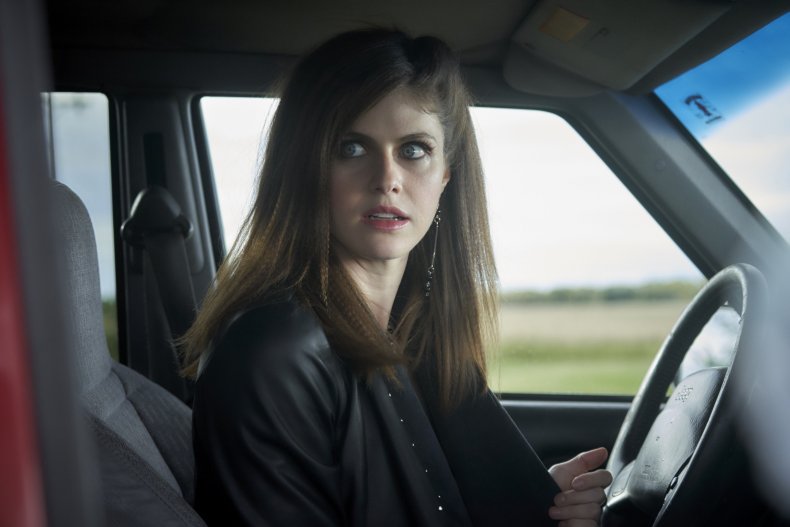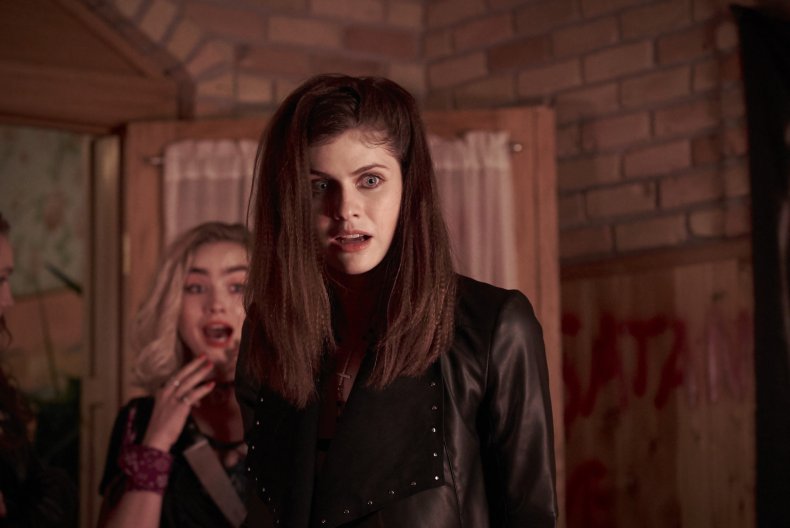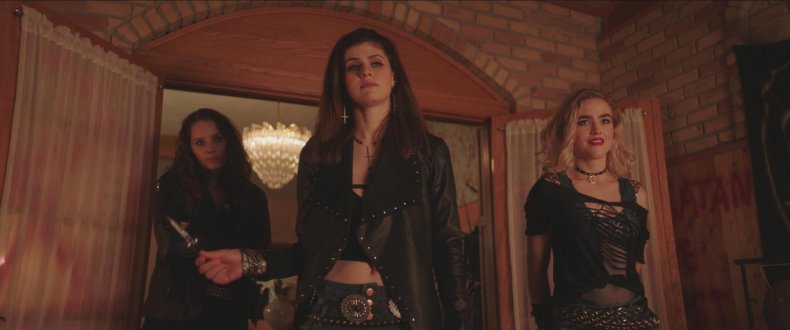In an interview with Newsweek, Alexandra Daddario talks about having fun with her role as Alexis, the murderous villain obsessed with heavy metal music, in the new horror/comedy, We Summon the Darkness.
Now available Video On Demand, We Summon the Darkness follows Alexis (Daddario) and her friends during their road trip to a heavy metal concert. While out on the road, they stumble upon a news report about local murders. As word spreads about their recently committed crimes, Alexis and her buddies are secretly planning the next stage of their satanic killings.
Daddario has bounced back and forth between comedy and drama. In one of her dramatic roles. Daddario faced off against serial killer, Leatherface, in the 2013 thriller, Texas Chainsaw 3D. Switching over to another genre, the 34-year-old actress has starred in such romantic comedies, such 2018’s When We First Met and 2019’s Can You Keep a Secret? And now, Daddario seamlessly transitions between horror and comedy with her latest, We Summon the Darkness.
During our one-on-one phone conversation, Daddario chatted with Newsweek about how heavy metal music influenced her role, finding the absurdity and seriousness within the humor, and raising money for charities during the pandemic.

I loved how you played Alexis. She’s cool, confident, and she’s the leader of the pack. Was that a fun character to build?
Definitely! It was so incredibly fun! It’s fun to play such a wild character at those social conventions. And my cast members approached it in the same way. They understood what movie they were in. And they really allowed a really fun environment to play. So we had a really good time! And I think that shows on screen.
We Summon the Darkness dives into heavy metal bands, groupies, and Metallica. What music did you listen to to prepare for the role?
Newsweek subscription offers >
That’s such a good question! I don’t listen to a lot of heavy music, heavy metal music, or any at all. So, it was really the first time I had explored going into more heavy metal. I didn’t listen to a ton of it. We listened to a lot on set, but I couldn’t be specific about what I was even listening to. But you’re right, music is such an important part of creating a character. Usually I do have headphones on set, and I listen to music before I go into a scene, but that’s not always the case. It depends. And in this case, the environment was sort of maddening enough! And the music we were playing on set was enough for me to feel at home in the world it created.

There’s a hilarious moment where Alexis is freaking out, and Maddie Hasson’s Val is jumping up and down. They are both involved in a murder, when the local sheriff stops by at the crime scene unannounced. Was the humor mostly scripted? Or were you allowed to improvise?
We did some improvisation, and the script was definitely how the writer, Alan Trezza, is. I worked on a project of his before [2014’s Burying the Ex]. And he does create this environment that is so down to earth and wacky. And that’s how I sort of approach life and characters anyway. I find life to be very, very serious, and very, very absurd at the same time. And so there is that combination of two. That’s where we try to find the humor, where it’s just so over-the-top, but we also wanted to find reality in it.
So we’re all reacting to it. Maddie found that absurdity in her role, while also making it feel real. And that really helped shape the environment. And so, I was just really grateful for my co-stars and their ability to do what they do. And what it felt like ping-ponging off of each other with that absurd world.
There’s a great scene that you have with Amy Forsyth’s Bev. In the scene, Bev (Forsyth) is unsure and has doubts about following Alexis’ sinister plans. You can interpret the scene in a lot of different ways. Alexis really does believe in sisterhood. She’s trying to empower Bev, but not really. Alexis has to convince Bev to follow through with her murderous plans. How did you approach this scene?
Well, with Amy, I just approached it like I was going in there. One of the things about Alexis, my character, is that she doesn’t have any shame. She doesn’t really think that anything she’s doing is wrong. It’s more just about fighting everything, and trying to make it all happen in the way she wants it to happen. And she sees Amy Forsyth’s character as a weak link. And so, she just goes in there and she knows exactly how to. I just went in there to manipulate her. And that was my character’s goal.

You’ve been in other comedies like Baywatch and The Layover. Were you able to let loose more with this movie because We Summon the Darkness is also horror?
I don’t know if I’m a comedian per se. I do think that I can be funny. I think that I’m really trained in improv. For me, I never thought about being funny. I always wanted to be a dramatic actress. But I think if you can do both, and if you have a deep understanding of your characters and of life, I think that there’s humor that comes out anyway.
I do think comedy’s very hard. I couldn’t say why, what it is specifically to be funny. I find that it’s more about character-based stuff. like, It’s this idea of absurdity to me, and my instincts as far as absurdity go, I think that we deal with difficult things through humor.
And I think the world’s absurd, as it is sadly scary and serious. And so, I try to find a little bit of absurdity in everything.
How did We Summon the Darkness change you as an artist?
I think every single project that I do I learn from it, whether that means that I failed and I learned from that, or I succeeded and I learned from that, or a little bit of both. I think with every project I feel more confident. So the biggest thing I can say is since I’ve gotten older as an artist, I feel I’ve just discovered the confidence. It’s the most important thing you can have as a performer. This isn’t something that you even have to have in life necessarily, although that helps.
But I think that every time you create a new character, you do something and you feel proud of what you’ve done, you gain a little bit more confidence as a performer. So I think that’s very important to try to hold onto.
What are you working on next?
Well, at the moment, everything is grounded, so to speak. So at the moment, I’m focusing on what I can do to call, what I can create visually. I’m trying to raise money for charities that I feel can help, which charities to donate to, that kind of thing. So that’s really my main thing at the moment. But we’ll get back to getting productions in order when this is all over.
Getting back to doing movies is not my main priority at the moment. So I encourage anyone who’s reading this to donate to a charity that they think can help. Because there are people who are out risking their lives to help the world right now.